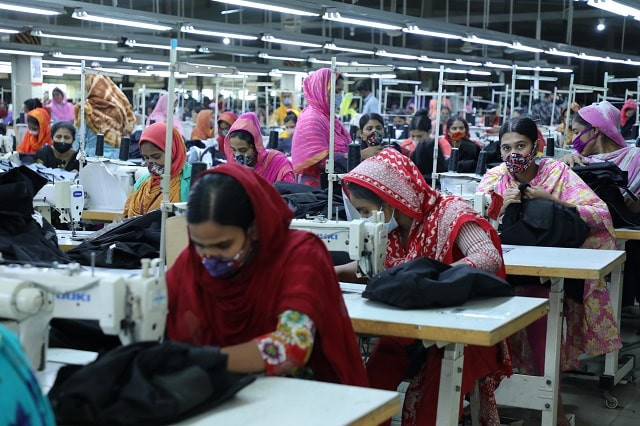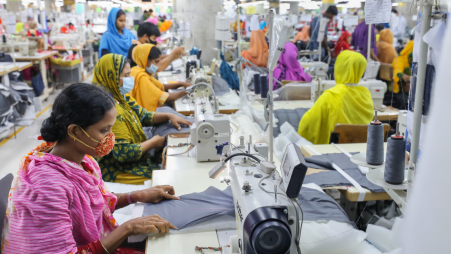Businesses seek duty-free investment facility in EZs for next 5 years
The businesses of the country’s textile and apparel sector urged the government to postpone the proposed duty policy in the economic zones (EZ) investments for next five years.
Earlier, in the budget proposal for FY25, presented in parliament on June 6, Finance Minister Abul Hassan Mahmood Ali proposed a 1% import duty on all types of capital machinery for industries in economic zones and high-tech parks for the fiscal year 2024-25, which is zero currently.
He also stated that used construction materials brought in by developers for the development of economic zones will also be subject to a 1% duty.
Businesses also demanded to approve loans and permitting gas and power connections in the factories located outside of industrial zones until the EZs’s full preparedness.
They said that if the government does not change the policy, it will severely impact the investments, and as a result, employment generation will be hampered.
They made the remarks in a post-budget joint press conference on Saturday, held at the BGMEA office in the capital.
Three apex trade bodies of the RMG and textile sector, the Bangladesh Bangladesh Garment Manufacturers and Exporters Association (BGMEA), Bangladesh Textile Mills Association (BTMA) and Bangladesh Knitwear Manufacturers and Exporters Association (BKMEA), jointly organized the press conference.
Replying to a question, BGMEA President SM Mannan Kochi said that they bought 46 plots in the EZ, but it will take at least three years to set up factories.
“Many entrepreneurs have already set up factories outside of industrial zones, and are awaiting utility connections. If the government will not provide utility connections, and banks do not approve loans for these factories, where will they go? Besides, it will be difficult for small entrepreneurs to set up factories in the EZs,” he added.
He also urged the creation of a fund for small and medium entrepreneurs with minimum interest rates for at least 15 years, saying that otherwise, small entrepreneurs would not grow considering the ongoing high interest rates and business establishment costs.
The finance minister said in the proposed budget that he will reduce cash incentives and other fasciitis to prepare for LDC graduation. The facilities will be stopped after graduation as per the WTO rules, and exporters will have to face open competition.
Regarding the issue, BGMEA Vice President Abdullah Hil Rakib said that as per the WTO rules, the government would continue the cash incentives facility for six years after graduation.
“Otherwise, the government would provide incentives through alternative ways. We demanded from the finance ministry that either they continue existing facilities till 2032 as per the WTO clause 27 or provide alternatives before stopping the current policy. We again urged the government to do the same considering the country’s economy and employment,” he added.
Kochi said that India graduated in 2007 but the Indian government still provides policy support, incentives and other support to its textile and RMG sector in its various states.
“We are passing through a tougher situation than Covid-19 due to global geopolitical tensions and economic turmoil. Government can provide us with those supports if they will,” he added.
BKMEA Executive President Mohammad Hatem said that they demanded to reduce the source tax at 0.5% from the existing 1%.
“The government did not address anything on the budget proposal in this connection. We also demanded to consider source tax as the final settlement, but the finance minister did not say anything in his budget speech. We are still demanding the same,” he added.
Replying to a question, BTMA President Mohammad Ali Khokon said that the textile sector is severely facing gas and energy supply shortages, which impacted production.
“’As we failed to supply RMG makers, they increased yarn and fabric imports to meet their demand. If Petrobangla supplies at least 3,000 metric million cubic feet per day in the national grid, we will be able to survive,” he added.
He also said that considering the importance of lead-time maintenance and product sustainability, they strongly demand the withdrawal of 7.5% VAT on the collection of garment industry waste and 15% VAT on the supply of fibers produced from it.
In the press conference, the BGMEA President said that in the proposed budget, the finance minister imposed a 200%-400% penalty in case of an HS Code mismatch by unintentionally.
“Where customs and NBR frequently harass us for very negligible reasons, the mentioned penalty will again pave the way to harass us. It is not realistic. We urge the government to withdraw the proposal,” he added.
The textile millers and garment manufacturers today said the primary textile sector and the garment sector will face pressure as many issues have not been addressed in the proposed budget.
They also said that the primary textile sector and the garment sector will face pressure as many issues have not been addressed in the proposed budget.
Responding to the NBR Chairman’s claim of whitening black money as per businesses’ requests, they denied it and said that they all are against the whitening of illegally earned black money.
Along with the presidents, the vice presidents and directors of the BGMEA, BKMEA, BTMA were also present at the press conference.

























